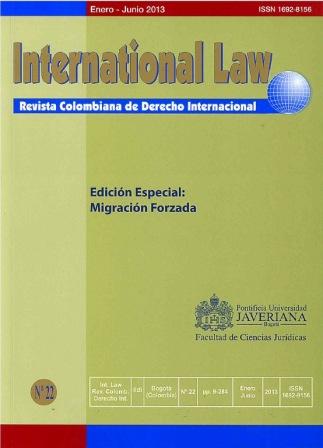Resumo
Environmental degradation and the effects of climate change have direct and indirect impacts on the effective enjoyment of human rights. Countries where the effects of environmental change and degradation occur are mostly likely to be vulnerable to human displacement, due to the lack of available adaptation resources, poor human resource implementation capacity and often a deficient human rights protection record. Such countries are also the ones least likely to proactively lobby governments at the national and international levels. While the exact number of people displaced is hard to estimate predictions are of approximately 150 million of environmentally displaced persons by 2050. This analysis starts by portraying the human impacts of environmental change, and then concentrates on the home states obligations under international human rights standards in parallel scrutiny with regional and international jurisprudence. The aim is to establish which duties home states have with regards to respecting human rights and ensuring a healthy and safe environment by avoiding environmental degradation. A further aim is to establish how states duties are transferable in the environmental change context; in particular, what protecting obligations states have towards environmentally displaced persons. This paper explores the duty of states to protect environmentally displaced people through a dynamic model of internalisation of protection obligations: respecting and fulfilling people’s needs in an interactive, international assistance, cooperative and participatory process. Ultimately, the global polity of states must find ways to deal with new legislative challenges in this current world of permanent emergencies of natural and human made environmental degradation and change.
Esta revista científica se encuentra registrada bajo la licencia Creative Commons Reconocimiento 4.0 Internacional. Por lo tanto, esta obra se puede reproducir, distribuir y comunicar públicamente en formato digital, siempre que se reconozca el nombre de los autores y a la Pontificia Universidad Javeriana. Se permite citar, adaptar, transformar, autoarchivar, republicar y crear a partir del material, para cualquier finalidad (incluso comercial), siempre que se reconozca adecuadamente la autoría, se proporcione un enlace a la obra original y se indique si se han realizado cambios. La Pontificia Universidad Javeriana no retiene los derechos sobre las obras publicadas y los contenidos son responsabilidad exclusiva de los autores, quienes conservan sus derechos morales, intelectuales, de privacidad y publicidad.
El aval sobre la intervención de la obra (revisión, corrección de estilo, traducción, diagramación) y su posterior divulgación se otorga mediante una licencia de uso y no a través de una cesión de derechos, lo que representa que la revista y la Pontificia Universidad Javeriana se eximen de cualquier responsabilidad que se pueda derivar de una mala práctica ética por parte de los autores. En consecuencia de la protección brindada por la licencia de uso, la revista no se encuentra en la obligación de publicar retractaciones o modificar la información ya publicada, a no ser que la errata surja del proceso de gestión editorial. La publicación de contenidos en esta revista no representa regalías para los contribuyentes.


